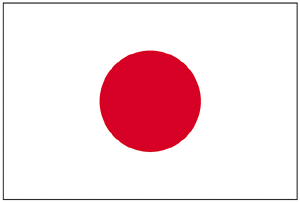 Japan
Japan
Here is the list of the countries from which I have ever collected information. I welcome more information from other countries and other information from the countries below!!
 Japan
JapanIn junior high school, English is taught with a lot of communicative activities, mostly worked in pairs or small groups. However, the way of teaching gradually shift from communicative to entrance exam-oriented especially for the ninth graders, most of whom are to take the high school entrance exam later that year, and classes are conducted mostly in Japanese with emphasis placed on teaching translation and grammar.
In senior high school, the situation gets even worse and from the beginning English is taught with a lot of emphasis on teaching reading comprehension (or rather translation) and grammar. Most of the teachers teach English in Japanese, spending a lot of time explaining about how to translate sentences and grammar and ask the students for rote learning, which they think is important and necessary for them to prepare for the college entrance exam. Though there are some other foreign languages provided in some schools, almost all high school students take English.
In July, 2002, however, the Ministry of Education, Culture, Sports, Science and Technology (MEXT) formulated a strategy to cultivate "Japanese with English abilities" in a concrete action plan with the aim of drastically improving the English education of Japanese people. This is mainly because the English-speaking abilities of a large percentage of Japan's population are inadequate at present, and this imposes restrictions on exchanges with foreigners and creates occasions when the ideas and opinions of Japanese people are not appropriately evaluated. You can get the whole picture of this strategic plan from MEXT's page, Regarding the Establishment of an Action Plan to Cultivate "Japanese with English Abilities" [Hiroyuki Yukita: Aomori, Aomori]

You might get more information on Japan from the following sites:
 Ministry of Education, Culture, Sports, Science and Technology
Ministry of Education, Culture, Sports, Science and Technology
 ELT News
ELT News
 The Japan Exchange and Teaching (JET) Programme
The Japan Exchange and Teaching (JET) Programme
 Web Japan
Web Japan
 Israel
IsraelIt is a wonderful profession here--we have a lot of English speakers from America, Canada, England, Australia and South Africa teaching, as well as Russians and Israelis. There is wonderful training--the English Teacher's Assoc. of Israel. I teach weak classes--I emphasize remedial work in all areas after assessing students; language awareness (from ABC's through vowel combinations, suffixes, prefixes, etc.); learning strategies, especially for reading, and development of helpful skills (e.g. use of dictionary). There is a strong emphasis on silent free reading here now. In my classes, I try to work through independent learning centers, e.g. using graded work cards, writing practice, etc. Many weak students need advice and training on how to study, learn and work with a foreign language. [Ellen Serfaty: Pisgat Zeev]
I am a ninth grade high school student. In our country we start learning English in the 4th grade (i.e. when students are 10 years old). Some elementary schools teach English from the second or even the first grade, but this is still rare in Israel. Israeli pupils have many difficulties learning English and most of the students are taking private lessons. Maybe that's because Hebrew is written from right to left, and English is written from left to right. Moreover, the Hebrew grammar rules are so different from the English rules; for example, in English the adjective comes before the noun and in Hebrew the noun comes before the adjective.
The elementary school ends in the 6th or 8th grade (depends on the city it is located in). In the 4th grade English teachers spend most of the time on listening comprehension. The teacher speaks English and translates every sentence into Hebrew. Students also learn the English alphabet in this grade. In the 5th-8th grades pupils learn many "vocabulary" words in order to make their English understood easier. They also learn the basic tenses, such as Present Progressive, Present Simple, Past Simple and Future. In the 8th grade students start doing grammar exercises more often. I study in the 9th grade, which is called "Kita tet" in Hebrew. And it's not easy at all to study English in that grade. The material becomes harder. We read many long texts and do "unseens" very often. We also read English books and make book reports. The teacher speaks English all the time without any Hebrew words. It helps to improve your listening skill. In Israel we study English till the 12th grade, which is the last grade in high school. Students will take the "Bagrut" exams in English. [Gal Slonim: Ramat-Gan]

You might get more information on Israel from the following sites:
 Ministry of Education, Culture and Sport
Ministry of Education, Culture and Sport
 ETNI (English Teachers Network in Israel)
ETNI (English Teachers Network in Israel)
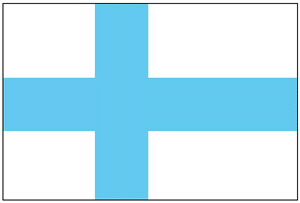 Finland
FinlandFinland has the highest child literacy rate in Europe. Within last 20 years or so communicative English skills have increased significantly. This may be attributed to high exposure to English on TV and the radio. English language TV programs are subtitled in Finnish, but never dubbed (except for programs for the very young such as cartoons).
Now that Finland is part of the European Union there is a need for Finnish businesses to develop their foreign language skills - mainly English, German and Russian. As a result there is a demand for teaching EFL (English as a Foreign Language) and there are many language schools that cater for the business English sectors.
Language schools are not regulated in Finland in the same way as in other countries (eg with British Council accreditation) so standards vary a lot. Many language schools prefer a teaching qualification (eg UCLES/RSA CTEFLA) but some will accept native speakers of English with little or no teaching experience (both American English and British English).
Rates of pay can vary from 80 Finnish Markka upwards per teaching hour (45 mins), depending upon experience. In terms of the McDonald's global economic index (the price of a McDonald's Big Mac meal is about 30 FIM) the cost of living is quite high.
Helsinki is the capital of Finland and the most densely populated part of Finland. The rest of the country consists mainly of lakes and forests. Business in Finland is very quiet from midsummer through July when most people take advantage of the short summer and leave for the countryside (unpredictable - sometimes very hot 25C, sometimes cold and wet). Winters can be very cold (greater than -20C), dark and wet (with frequent rain/snow). [David Paul: Wordskills.com]

You might get more information on Finland from the following sites: Ministry of Education
Ministry of Education The Finnish National Board of Education
The Finnish National Board of Education
 Description of Education System - Finland
Description of Education System - Finland
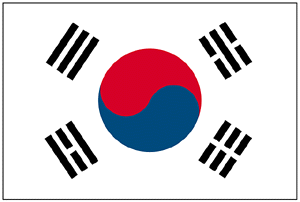 South Korea
South KoreaSo, that's the basics of what is going on in Korean middle schools (and like I said, high schools also). That's why there are so many private institutes with native speakers. That's where the students go to learn how to speak English. [Dean Comeau: SISA ELC Foreign Language Institute, Youngju, Kyungbuk]
I guess the situation in high schools is almost the same as that of Japan; study as hell to enter prestigious college. In English classes students learn about English, not English itself; only reading and understanding relatively difficult passages and answering questions (multiple choice ones and fill-in types). Theoretically and actually students can't write or speak in English after three-year-learning of English in Korea however bright the student may be.
In Korea "Open Education" has been catching on these days. It has two important points:
1. Students of various levels have to learn according to their levels.
2. Students, not teachers, decide their learning speed and what to learn in classes.
To adopt the theory into English classes,
1. Teachers decide in what level each student is (in a students-friendly way)
2. Teachers make various types of materials (four skills, for example) for the levels. [Yeon Heo: Pusan]

You might get more information on South Korea from the following sites: Ministry of Education, Science and Technology
Ministry of Education, Science and Technology Korea TESOL
Korea TESOL
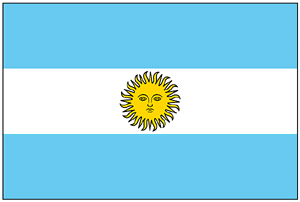 Argentina
Argentina*Private schools, with different fees, ranging from rather cheap to very expensive:
In some schools you can study English at a basic level while in others you can graduate with O or A levels, IGCSE, First Certificate or Proficiency Cambridge exams.
*State secondary schools where English is one of the foreign languages included in the curricula, the other being French:
The level is generally very low, putting most of the attention in filling in activity books and paying little attention to oral production. I don't know how many students attend public secondary schools but I would say that in Buenos Aires most middle-class families try to send their children to private schools as most public schools haven't gotten a high reputation and classes are sometimes crammed with students.
*Private institutes which teach English alone:
They are an option for families who cannot afford a private school. Many students, after school, attend English classes where they can be prepared to sit for UCLES exams, from PET up to Proficiency.
*Some private teachers also prepare students for Cambridge exams in their homes:
Cambridge exams are very popular in my country and I think we are one of the countries in Latin America which present the largest number of candidates.
Now, due to the reform, the teaching of a foreign language is compulsory in primary school from fourth form (nine years old). Schools can choose the language and Buenos Aires province has chosen English, but it's not very clear, at least to me, how they plan to implement this. I think it's because everything is so new. [Gladys Ledwith: Buenos Aires]
I can see that some things in Argentina are very similar to Japan; I mean classes are big, considering that the number of students in each class is between 26 and 40. We have two types of schools: the State School and the Private School (I work in a private school). The State Schools are numerous and students start learning English in the 4th year when they are 9 years old. In the Private Schools students start with English classes in Kindergarten when they are 4 and/or 5 years old. They start learning some greetings, colours, animals, numbers, etc., i.e,easy vocabulary and of course, everything is oral at this stage.
I work with teenagers (from 13 to 17) and they have 90 minutes of English a week. (We, teachers have so little time to do things in class!!!) In class, I try to speak in English all the time except for the explanations that I consider to be explained (sometimes, of course) in Spanish. [Maria Laura]

You might get more information on Argentina from the following site:
 Education in Argentina
Education in Argentina
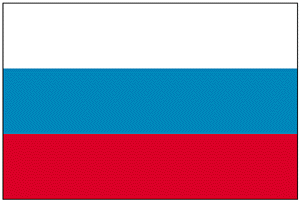 Russia
Russia
You might get more information on Russia from the following site: Databases and References
Databases and References
 Brazil
Brazil
You might get more information on Brazil from the following site: Education in Brazil
Education in Brazil
 An overview of the TEFL situation in various countries (continued)
An overview of the TEFL situation in various countries (continued)